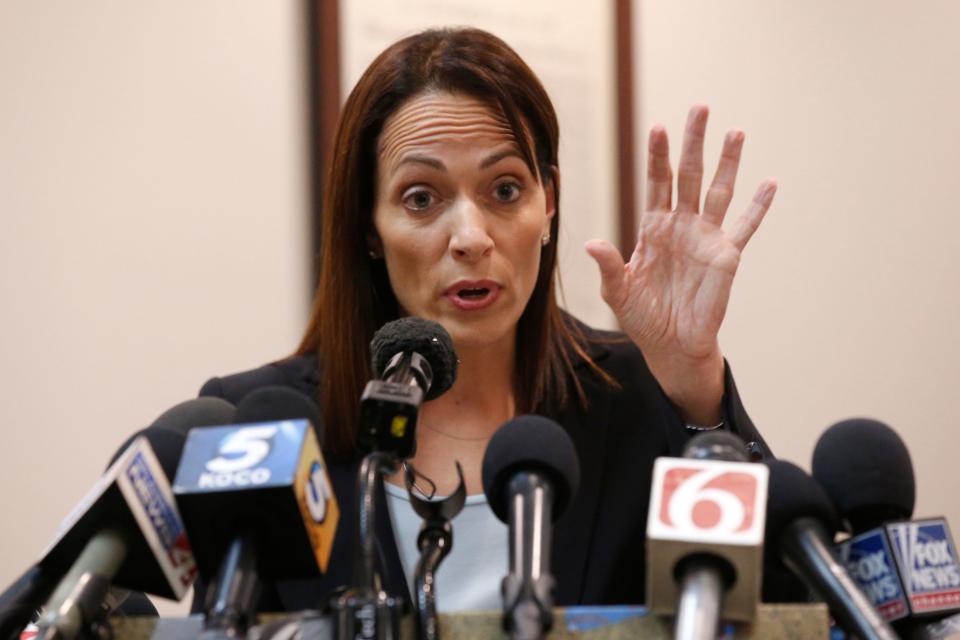Johnson & Johnson to pay $572 million for role in opioid crisis; company says ruling 'flawed'
An Oklahoma judge on Monday ordered Johnson & Johnson and its subsidiaries to pay $572 million to help abate the opioid crisis in the state, a landmark decision likely to reverberate in lawsuits across the nation.
The case was closely watched as a federal judge in Ohio oversees more than 2,000 lawsuits filed by city, county and tribal governments across the nation against manufacturers, distributors and retailers of prescription painkillers.
The Oklahoma ruling came in the first state opioid case to reach trial. The state previously settled with OxyContin-maker Purdue Pharma and Israel's Teva Pharmaceutical for a total of more than $350 million.
"The opioid crisis is an imminent danger and menace to all of us," Cleveland County Judge Thad Balkman. "The defendants ... misleading marketing and promotion of opioids ... compromised the health and safety of thousands of Oklahomans."
The lead lawyers for the federal litigation issued a statement calling the Oklahoma ruling a critical step for their consolidated cases ahead of the trial set to begin Oct. 21.
Balkman's decision "serves as another milestone amid the mounting evidence against the opioid pharmaceutical industry who we allege started, fueled, and conspired to create the largest public health crisis of our time," the statement said.
Oklahoma Attorney General Mike Hunter says opioid overdoses killed more than 4,600 people in the state from 2007 to 2017. The state has estimated it will take $17.5 billion over 30 years to abate the crisis.

"Our case revealed how corporate greed got in the way of responsible practices by Johnson & Johnson," Hunter tweeted Monday. "Thousands of Oklahomans have died as a result."
Hunter called Johnson & Johnson a “kingpin” company that was motivated by greed. He specifically pointed to two former Johnson & Johnson subsidiaries, Noramco and Tasmanian Alkaloids, which produced much of the raw opium used by other manufacturers to produce the drugs.
On Monday, Hunter said the Oklahoma case could provide a “road map” for other states to follow in holding drugmakers responsible for the opioid crisis.
“That’s the message to other states: We did it in Oklahoma. You can do it elsewhere,” Hunter said. “Johnson & Johnson will finally be held accountable for thousands of deaths and addictions caused by their activities.”
An attorney for the defendants said they plan to appeal the ruling to the Oklahoma Supreme Court. In closing arguments last month, lawyers for the pharmaceutical giant claimed the company was part of a lawful, heavily regulated industry serving a critical health need.
Sabrina Strong, an attorney for Johnson & Johnson and its subsidiaries, said the companies have sympathy for those who suffer from substance abuse but called the judge’s decision “flawed.”
“You can’t sue your way out of the opioid abuse crisis,” Strong said. “Litigation is not the answer.”
Eric Schiffer, CEO of Reputation Management Consultants, called the case the "single greatest self-inflicted reputational wound to a healthcare brand in modern American history."
Schiffer told USA TODAY he believes Johnson & Johnson can weather the opioid litigation storm financially. But brand trust, built over time, can crumble in a hurry, he said.
"From a balance sheet standpoint this is not an existential event," Schiffer said. "But from a brand standpoint this is like the Hindenburg."
Prescription opioid painkillers are showing signs of fading as a cause of drug overdose deaths, according to a report from the Centers for Disease Control and Prevention issued last month. The CDC reported 12,757 overdose deaths from prescription painkillers in 2018, down from 14,926 deaths in 2017.
Four other drug categories – methamphetamine and other stimulants, cocaine, heroin and fentanyl – each caused more fatal overdoses last year than opioids such as oxycodone and Vicodin, the CDC said.
Among those seated in the courtroom on Monday were Craig and Gail Box, whose son Austin was a 22-year-old standout linebacker for the Oklahoma Sooners when he died of a prescription drug overdose in 2011.
One of the attorneys for the state, Reggie Whitten, said he also lost a son to opioid abuse.
“I feel like my boy is looking down,” Whitten said after the judge’s ruling, his voice cracking with emotion.
Oklahoma pursued the case under the state’s public nuisance statute and presented the judge with a plan to abate the crisis that would cost between $12.6 billion for 20 years and $17.5 billion over 30 years. Attorneys for Johnson & Johnson have said that estimate is wildly inflated. The judge’s award would cover the costs of one year of the state’s abatement plan, funding things like opioid use prevention and addiction treatment.
Contributing: Ken Alltucker; The Associated Press
This article originally appeared on USA TODAY: Johnson & Johnson ordered to pay $572 for role in opioid crisis

